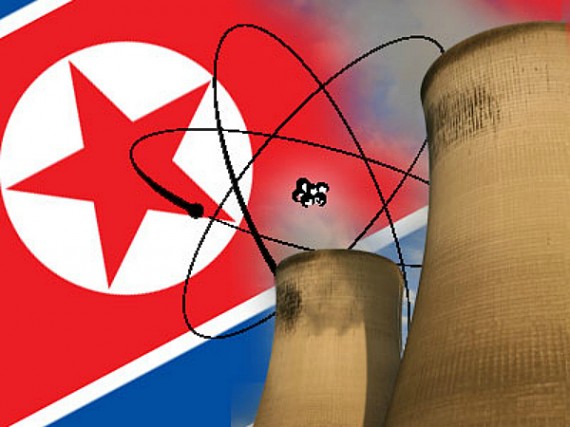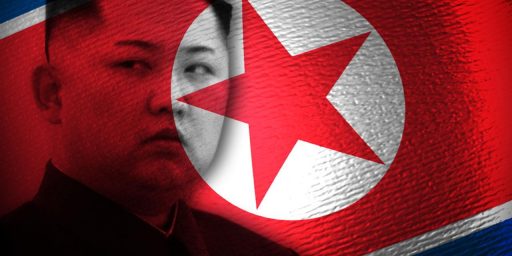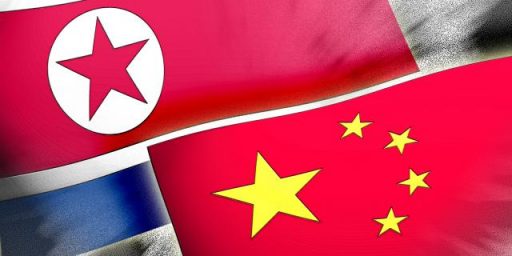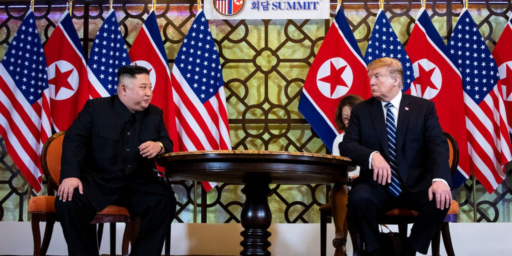China, U.S. Agree On North Korea Sanctions That Are Unlikely To Accomplish Anything
Can anything restrain the North Koreans besides direct action by China? That's unclear, but the new round of sanctions pending at the U.N. seem unlikely to accomplish much of anything.
Amid all the political coverage here in the United States, most every news outlet appears to have missed the report yesterday that the United States an China have apparently agreed on new sanctions against North Korea, but there are doubts about how effective they can be in restraining a regime that doesn’t seem to care about international opinion:
UNITED NATIONS — The United States and China reached an agreement to impose tougher sanctions against North Korea, in what appeared to be a diplomatic shift by Beijing regarding its intransigent ally.
The proposed resolution is the product of intense negotiations between the two nations over the last seven weeks, since Pyongyang tested a nuclear weapon it claimed was a hydrogen bomb. It was circulated to members of the United Nations Security Council on Thursday, and diplomats said it could come up for a vote in the coming days.
Diplomats said the fact that Washington and Beijing had agreed on a set of measures increased the international pressure on the North Koreans. In the past, after previous nuclear tests condemned by the Security Council, China agreed only to banning weapons transfers and limited sanctions against those linked to the nuclear program.
Whether the proposed new sanctions will succeed in curtailing Pyongyang’s nuclear ambitions remains to be seen. Past efforts to halt its nuclear program have not been fully carried out, nor have they prevented North Korea from pursuing a nuclear arsenal. Whether China would follow through on tougher sanctions was also a key question.
United States officials declined, without explanation, to provide the text of the resolution.
The proposed measures, according to a United States official, would ban the trade of conventional weapons, luxury goods like jet skis and Rolex watches, and aviation fuel to North Korea, which could effectively ground its national airline. It would also place prohibitions on dozens of new companies and individuals accused of trafficking in illicit nuclear material.
In what may be the toughest proposed measure, all North Korean cargo entering or leaving a country must be inspected by that country.
The mandatory cargo inspection applies to “anything going to and from the D.P.R.K.,” according to an American official who spoke on the condition of anonymity because of the delicacy of the talks. “If it is on your territory, in your ports or in your airports, there’s a requirement to inspect cargo to and from the D.P.R.K.,” the official said, using the initials for the Democratic People’s Republic of Korea.
In addition, 31 ships that have been known to traffic in illegal nuclear goods are to be banned from docking in any port. It is impossible to verify whether countries sending or receiving North Korean goods will carry out the inspections. However, they will be legally binding if the resolution is adopted.
Significant loopholes remain. North Korea would still be able to buy oil and sell its coal and iron ore, as long as it is not being used to fund its nuclear weapons program — which would be difficult to prove. China, North Korea’s main trading partner and diplomatic backer, is its main supplier of oil.
The draft resolution would also prohibit North Korea from exporting gold, titanium and rare earth minerals. It would ban countries from sending any item to North Korea that could be used by the North Korean armed forces, like trucks that could be rejiggered for military purposes.
The fact that the two main military powers in the region were able to come to an agreement regarding additional sanctions is, arguably, a measure of the extent to which Pyongyang has alienated itself from the world as a whole, including the nation that really counts as its only real ally in the world today. The United States, of course, has long been engaged in an effort to bring North Korea’s nuclear and ballistic missile ambitions under control with little actual success given the fact that the West has very little leverage left with a regime that is largely isolated from the rest of the world at this point. China has often resisted these measures to a greater or lesser degree not so much because they support the actions of the Kim regime, but because of their concerns about fostering the kind of instability on the Korean Peninsula that would cause problems on their own southern border. In recent years, though, and especially since the rise to power of Kim Jong Un in the wake of his father’s death several years ago, there have been numerous reports that Beijing has lost patience with its client state and, especially, the extent to which it has flaunted international conventions with continued testing of its nuclear and missile capabilities. At the same time, though, those same reports have said that China’s leaders are reluctant to pull the rug out from under Pyongyang for fear that it would lead to a rapid collapse of the regime and the rise of a united Korea fully allied with the United States that puts American and Korean troops on the Yalu River border with China.
Given all of that, getting China’s agreement to a new round of sanctions is an achievement on its own, but there are many in the area around the peninsula who wonder if these new sanctions will have any real impact on the Kim regime:
SEOUL, South Korea — As a new set of sanctions against North Korea circulated at the United Nations Security Council, analysts in South Korea and China expressed doubts on Friday that the measures would be tough enough to force the pariah state to give up its nuclear weapons.
The United States presented a draft resolution it had negotiated with China to the Security Council on Thursday, calling for wide-ranging penalties against North Korea for a nuclear test it conducted on Jan. 6 and for its launching of a long-range rocket a month later, both of which violated previous council resolutions.
The draft contained the most comprehensive and toughest sanctions against the isolated country that the council has ever considered. There was no doubt that they would squeeze North Korea’s ability to raise funds for its weapons programs, depending on how vigorously China, the North’s single largest trade partner, enforced the sanctions, analysts said.
If adopted, the resolution would require United Nations member states to inspect all cargo passing through their territories to or from North Korea for illicit goods. It would also attempt to limit North Korea’s sale of minerals, especially coal and iron ore, two of its most important exports.
But the draft contained no effective sanctions against a booming trade across the relatively porous 870-mile border between China and North Korea — a lifeline not only for the impoverished North Korean people but also for their government’s ability to earn cash. Nor did it require countries, especially China, to cut off oil exports to the North.
It would also not affect tens of thousands of North Korean workers at factories, construction sites and logging camps in China, Russia, Africa and the Middle East. According to some estimates, they send home between $200 million and $300 million a year, most of which human rights groups contend ends up in the coffers of the North’s leader, Kim Jong-un.
“These sanctions will certainly hurt the North,” said Koh Yu-hwan, a professor at Dongguk University in Seoul. “But I don’t think they will hurt them enough to abandon their nuclear weapons.”
Analysts in China said Beijing’s approval of the sanctions proposed by the United States was the result of a complex calculus by Communist Party leaders. A factor that has loomed large for them in recent weeks is plans by Washington to deploy an antiballistic missile system, called Thaad, in South Korea. Chinese officials are seeking ways to prevent that from happening.
“If it was not for the Thaad issue, there might not be such cooperation between China and the U.S.,” said Shen Dingli, a professor of international relations at Fudan University in Shanghai. “By doing this, it is still possible for China to dissuade the Americans from deploying Thaad at China’s doorstep.”
China’s agreement to limit imports of North Korean coal and iron ore, for example, came with an important caveat: It should be demonstrated that such imports would support illicit North Korean activities. North Korea’s minerals, mainly its coal and iron ore, accounted for 53 percent of its $2.8 billion in exports to China in 2014, according to data compiled by the government-run Korea Institute for National Unification in Seoul.
But because of a slowing Chinese economy and sharp declines in global prices, those coal and iron ore exports have been decreasing since 2013. North Korea has already begun making up for the shortfall by exporting more workers abroad, the analyst Lee Seok said in a report published by the Korea Institute last month. The workers have therefore become an increasingly important source of cash for the North Korean regime.
Nor would the proposed sanctions affect North Korea’s growing business of making clothes on contracts from Chinese companies. North Korean textile exports to China expanded to $741 million in 2014 from $186 million in 2010, and the goods are made mostly at factories run by the North Korean military or the ruling Workers’ Party, analysts and officials in Seoul said.
“There are still too many loopholes for us to predict that they will lead to North Korea’s denuclearization,” said Chang Yong-seok, an analyst at the Institute for Peace and Unification Studies at Seoul National University. “These sanctions are more like a warning to the North about how much more it could suffer if it conducted another nuclear test, and an inducement for the country to return to the negotiating table.”
Given the fact that the sanctions that have been imposed over the past two decades or more have not proven to be entirely effective in restraining North Korea’s nuclear and missile ambitions, the assessment that this latest round of sanctions is not likely to be sufficient to dissuade Pyongyang from moving forward with both programs seems correct. Indeed, over the past twenty years or so the only thing that seems to have caused North Korea to restrain itself has been when the nation has experienced one of its frequent famines and needed to come to the West for food aid. Even then, though, whatever behavior changes Presidents Clinton, Bush, and Obama have been able to extract from the Kim Regime have been temporary and typically quite superficial. In the long run nothing, not even public admonitions from its sponsors in Beijing, has restrained North Korea from pursuing the dual goals of developing both ever more improved nuclear weapons and missiles capable of reaching further and further to the point where it is now believed that they would at least theoretically be capable of reaching Hawaii and possibly even parts of Alaska and the West Coast of the United States. These latest sanctions seem unlikely to be any more successful in restraining Pyongyang than any of those previous policies.
As others who are far more expert in this area than I am have said repeatedly, in the end it seems clear that the fate of North Korea lies solely in the hands of the Chinese. Given their economic leverage over the country, they are the only nation on the planet that could arguably cause the Kim regime to divert from the course it has been on for some time now. Of course, given the fact that the Chinese have apparently been admonishing Pyongyang for some time now we have likely reached the point where “warnings” from China about the possible consequences of continued defiance of the rest of the world may not be enough to cause Kim to restrain his government in its current policies. If China wants to see North Korea change course, it may be required to act, presumably by cutting off trade with the country in a way that hurts not just the general population but also the leadership and, most importantly, the military. The problem with that strategy, of course, is that it could provoke the very chaos that China wishes to avoid, but perhaps the Chinese need to come to realize that such chaos is likely to come sooner or later anyway so perhaps provoking it under more or less controlled circumstances may be the best of a very bad situation. What seems clear, though, is that continuing to ignore North Korea as we do now may end up being a luxury we can ill afford in the future.







Did anybody ask the Russians about this? It’s not like they’re not under sanctions, and might love to throw a wrench in a US-Chinese “success” story.
The mandatory cargo inspection is a measure I’ve been calling for for years and that the Chinese have signed onto it makes it a real possibility.
The reason it’s important is not for what’s going into North Korea but what’s coming out. With this measure in place we can prevent the North Koreans from getting into the business of selling nuclear weapons which IMO is a prospect we have more to fear from than their using nuclear weapons against us.
Doug, I agree with you that China does not want the NK regime to fall but not entirely for the reason you give. While they may fear a unification of the North and the South what they really fear is a flood of refugees streaming over their southern border.
I also think the U.S. should start installing that missile system ASAP..
I don’t know a lot about the history of U.N. sanctions, but these sound pretty severe. Given that, I have to second Mu’s question about Russia.
@Mu:
The Russians seem to accept the theory that the ruling family is attempting to transform their army-based economy to something which might someday be capable of integrating with the world’s economy. A very tricky move, considering all the vested interests inherent within any long-standing system. There’s nothing for it though, the leaders know sooner or later they will no longer be the sole source of information to their people. The people must be doing well at that time or they will string the rulers up by their nads with piano wire, and that will probably be the least painful part.
To the point, they have a people deeply steeped in xenophobia and paranoia, even totally pickled on the stuff. You just slash the military, which they have been utterly convinced is the only thing standing between them and sure death or worse from the US, and you set the stage for your own death by a general or colonel in a military coup, the vested interest I previously mentioned. Their lives are cushy and god knows what their and their families fate would be in some new system.
So what do you do? You start indoctrinating your people that they now have a nuclear “umbrella” that makes them all “invulnerable”, and you off any general whose harrumphs lack the proper gusto.
This is probably known to our leaders as well, but they are dealing with a people deeply steeped in xenophobia and paranoia, even pickled in it. They too must cover their asses until that passes.